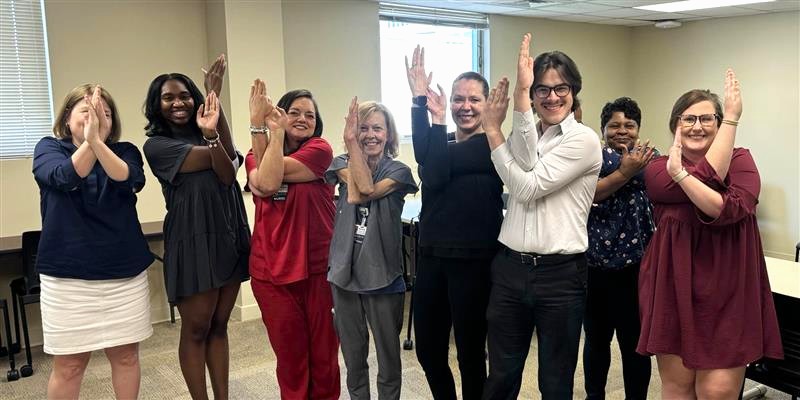 |
| Russell Cantrell, MSCIS, MBA; Melisa Pierce, Ed.D., MPA; and David S. Williams, Ph.D., MPA, presented at the virtual conference. |
Three members of the Whiddon College of Medicine’s Office of Accreditation and Planning presented at the 2nd annual Accreditation Preparation & Quality Improvement (APQI) Conference, held virtually on May 21. Centered on the theme “Growing the Choir of APQI Professionals,” the conference brought together leaders, practitioners and researchers from medical schools across the country to share innovations and best practices in accreditation readiness and continuous quality improvement (CQI).
Melisa Pierce, Ed.D., MPA, director of quality improvement, and David S. Williams, Ph.D., MPA, assistant dean for institutional and academic success, co-presented a two-part session focused on the Data Collection Instrument (DCI) — a central component of the Whiddon COM’s LCME accreditation efforts — and its role in shaping a culture of CQI.
In “The DCI Overture: Setting the Stage for Accreditation Readiness,” Pierce and Williams introduced a proactive, CQI-based framework that includes structured committee roles, integration of student feedback, and the use of an accreditation readiness heat map to monitor progress. Their approach emphasized how strategic planning and collaboration reduce last-minute efforts and increase institutional transparency.
Their follow-up session, “The DCI Encore: Elevating CQI Through Collaboration,” guided attendees through practical tools and peer-driven strategies to apply these models in other institutional settings. Through a virtual gallery walk, participants exchanged ideas on committee structure, data visualization, and embedding student input, ultimately identifying actionable ways to advance CQI through the accreditation process.
Russell W. Cantrell, MSCIS, MBA, director of data administration and strategic initiatives, presented “Melody in Metrics: Crafting Charts That Hit the Right Note.” His session explored the power of data visualization to transform raw numbers into coherent and compelling narratives. Drawing on principles of perception and design, Cantrell demonstrated how thoughtful use of layout, color and scale can enhance understanding, drive decision-making, and support institutional effectiveness, especially in the context of accreditation.
“Good charts rely on rhythm and clarity,” said Cantrell. “When space, color, and structure are used with intention, data stops being noise and starts making sense.”
In addition to her co-presentations, Pierce also facilitated a dedicated networking session titled “Best Practices for CQI,” during which participants shared strategies, challenges and solutions for embedding continuous quality improvement across their institutions.
“This year’s APQI conference was an opportunity to both share our work and learn from the collective experience of colleagues across the country,” Pierce said. “Our goal is to help institutions approach accreditation not just as a compliance exercise, but as a catalyst for long-term improvement.”
Williams added, “We’re proud to be part of this growing national conversation and to highlight how collaboration, structure and design can shape more effective and sustainable accreditation practices.”
The Whiddon COM Office of Accreditation and Planning continues to lead in aligning data strategy with collaborative processes, ensuring that CQI and accreditation efforts not only meet standards but also drive meaningful and measurable progress.



.jpg)



.jpg)






